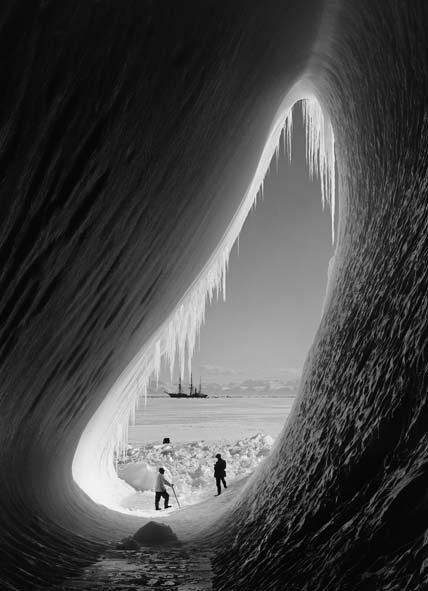Herbert G. Ponting
dal 25/3/2010 al 13/5/2010
Segnalato da
25/3/2010
Herbert G. Ponting
Flo Peters Gallery, Hamburg
The conquest of the South Pole. In 1910 Captain Robert Falcon Scott set sail aboard the research ship Terra Nova aiming to be the first man to conquest the South Pole. Also part of the crew was a photographer by the name of Herbert G. Ponting. The Photographs on show were printed with the platinum printing method from the original glass negatives.

With the exhibition Herbert G. Ponting: The Conquest of the South Pole the Flo Peters Gallery will present as of March 27th photographs of historic significance and incomparable suspense.
In 1910 Captain Robert Falcon Scott set sail under the British Flag aboard the research ship Terra Nova aiming to be the first man to conquest the South Pole. Also part of the crew was a photographer and cameraman by the name of Herbert G. Ponting. With his photographs of the expedition and its participants he not only left a unique document about the beginnings of polar exploration but also lets the posterity be part of one of the last great adventures of human discovery.
In 1913 the British expedition of the Terra Nova to the South Pole ended in tragedy. Robert Falcon Scott just missed the glory to be the first man on the South Pole. He lost the race to the Norwegian Roald Amundsen, who rammed the Norwegian flag into the snow just a month earlier. From the very start Scott had fallen behind with his expedition. His lack of experience in comparison to Amundsen as well as catastrophic weather conditions not only prevented a successful expedition outcome but also cost the lifes of Scott himself and four of his men. Scott and his four comrades all perished from a combination of exhaustion, hunger and extreme cold on their way back from the Pole and only 17 kilometres away from food and shelter.
Herbert Ponting, who boarded the Terra Nova 1910 as the expeditions photographer and cameraman returned to England in 1912 with more than 1700 awe-inspiring big scale glass negatives of arctic landscapes, the scientists and the expeditions circumstances. The archive of Herbert Ponting is situated today at the Scott Polar Research Institute of Cambridge University. The Photographs on show were printed in a co-operation with the Belgian publisher Salto Ulbeek with the platinum printing method (a high quality black and white printing method) from the original glass negatives. The result is a portfolio of photographs that impresses with a comprehensive tone wedge as well as an unrivalled brilliance and three-dimensionality.
Herbert Ponting took up photography relatively late in life, in 1900 at the age of thirty. Born into a wealthy family in 1870 in Salisbury/Great Britain he initially started his professional carrier as a businessman in the USA. Contrary to his previous business ventures he relatively quickly made a career as a free-lance photographer. He sold pictures from his travels to Japan, China, India and many more to magazines such as Illustrated London News, Graphic, Pearson’s or the Strand Magazine.
Ponting’s flair for journalism and ability to shape his photographic illustrations into a narrative led to his being signed as expedition photographer aboard the Terra Nova, the first professional photographer to be taken on any Antarctic expedition. As a member of the shore party of the Terra Nova in 1911 Ponting helped set up the winter camp Cape Evans where he was provided with a darkroom (in which he also slept). With the start of the 1911-12 sledging season, Posting’s fieldwork began to come to an end. After 14 months at Cape Evans, Ponting, along with eight other men, boarded the Terra Nova in February 1912 to return to civilization. In 1921 he published his pictures in a photographic essay about the expedition called The Great White South. Furthermore he helped with the production of a short sound film based upon his surviving video sequences called Ninety Degrees South (1933).
Ponting died in 1935 in London.
Image: Herbert G Ponting, Grotto in Berg-Taylor and Wright, January 1911 © 2009 Scott Polar Research Institute, University of Cambridge
For further information and press images, please contact:
nadine dinter - public relations + art administration Fasanenstraße 70 10719 Berlin Germany
tel: +49 (0)30 39887411 mobile: +49 151 12370951 email: presse@nadine-dinter.de
Opening: March 26th, 2010, 6 - 8 pm
Jean de Pomereu, editor, photographer and consultant on polar issues and Colin Ford, founder of the National Museum for Photography, Film & Television, UK. will be present and available for interviews.
Flo Peters Gallery
Chilehaus C, Pumpen 8, 20095 Hamburg Germany
Hours
monday-friday 12am - 6pm
saturday 11am - 3pm
and by appointment



